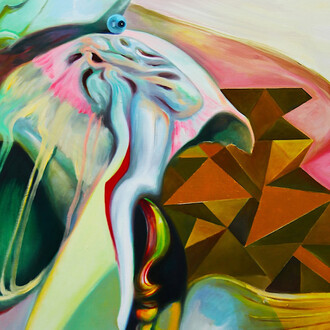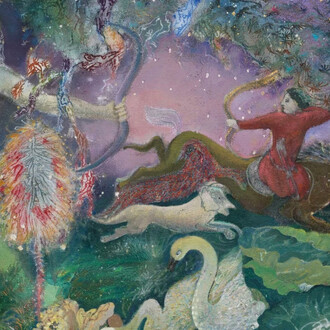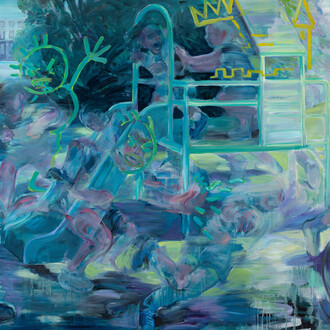James Cohan is pleased to present Esa munda macha, an exhibition of ceramic sculptures by Tecla Tofano, on view in the 48 Walker Street viewing room from September 6 through October 19, 2024. The artist Tecla Tofano (b. 1927, Italy, d. 1995, Venezuela) was a critical figure in the Latin American feminist movement, carving out a voice in the extremist socio-political atmosphere in Venezuela. A voracious maker, the artist channeled her ideas most notably through ceramics, though she was also an adept draftswoman, a metalsmith, and a writer. This special presentation highlights an important group of ceramics from the 1960s and 1970s, expanding upon the gallery’s November 2023 exhibition, Tecla Tofano: This body of mine.
Tofano’s meditations in clay were often infused with her biting sense of humor, though they also maintained a poignant and personal undertone. The artist’s initial foray into pottery in the 1950s began with throwing utilitarian objects on the wheel under the tutelage of Miguel Arroyo, a figurehead of Venezuela’s nascent craft movement. By the 1960s and into the ’70s, she shifted to hand-modeling body parts as well as domestic items ranging from food and books to totemic forms, fantastical figurines and elaborately formed vessels. Her visual language stood in direct opposition to the refined geometric abstraction and kineticism that was popular among her peers. Tofano embraced rough, hand-built surfaces, as evidenced in her uncompromising works.
The artist’s work revealed the cracks in a failing socio-economic system in Venezuela, Tofano’s home of over forty years. Her left-leaning activist views were a direct response to the volatile dictatorial climate that engulfed the country in the 1950s and to the oil boom of the 1960s and ’70s. She embedded her work with social commentary to explore issues of class, gender construction and sexism. The female body is specifically addressed in Tofano’s visual art and writing as an affront to pervasive machismo and a reflection of her personal traumas.
Towards the end of the 1970s, Tofano felt that she had exhausted the possibilities of visual art and refocused her energy and activist rhetoric on writing. The phrase, Esa munda macha, is the artist’s feminization of the masculine words mundo macho (macho world) as munda macha. Tofano used this to title a series of ceramics from 1973, one of which, the phallic work, Y poblaron al mundo (and they populated the world), is included in this presentation. Tofano’s play on words was her means to actively counteract patriarchal linguistic dominance by subverting the gendered structure of the Spanish language.
Tecla Tofano was born in Naples, Italy, on March 5, 1927. In 1952, she moved to Caracas, Venezuela, where she studied ceramics at the School of Plastic and Applied Arts. Tofano was an outspoken public intellectual and influential activist who taught at the Central University of Venezuela in Caracas from 1959 to 1980. Beginning in the 1960s, she wrote for the newspaper El Nacional and authored several books of fiction and poetry including Quien inventó la silla (who invented the chair?), 1968 and Yo misma me presento (I introduce myself ), 1974. Tofano presented her work in exhibitions at numerous galleries and institutions in Caracas including the Museo de Bellas Artes and the Galería de Arte Nacional. She was awarded the Premio Oficial de Artes Aplicadas at the 19th Salón Oficial, Museo de Bellas Artes (Caracas, 1958); gold medal at the International Exhibition of Contemporary Ceramics (Prague, 1961); and silver medal at the Exposición Internacional de Cerámica (Buenos Aires, 1962).
Tofano is featured in Crafting Modernity, Design in Latin America, 1940–1980 through November 10, 2024 at MoMA, New York. Recent group exhibitions include the 2015-2016 exhibition, Moderno, design for living in Brazil, Mexico and Venezuela, 1940-1978 at the Americas Society, New York and the Blanton Museum of Art, Austin, Texas and the pivotal 2017 exhibition, Radical women: Latin American Art, 1960–1985, which traveled from Hammer Museum, Los Angeles, to the Brooklyn Museum, New York and Pinacoteca de São Paulo, Brazil. Her ceramics were included in Cecilia Alemani’s exhibition, The milk of dreams at the 2022 Venice Biennale. She is represented in the collections of Galería de Arte Nacional, Caracas, Venezuela and the Museum of Fine Arts, Houston, Texas. Tecla Tofano died in Caracas on October 20, 1995.
In 2023, James Cohan published the first-ever monograph dedicated to the artist, co-edited by curator Gabriela Rangel and Luis Felipe Farías. It features an essay by Rangel, a detailed chronology by Farías, and translations of Tofano’s poetry and writing by Lucía Hinojosa Gaxiola.
















